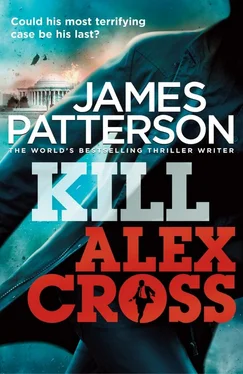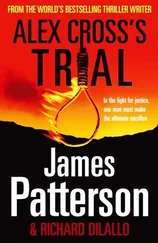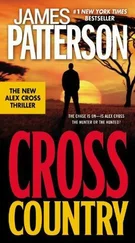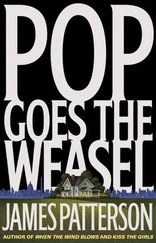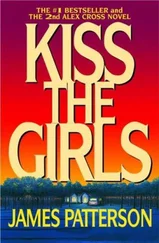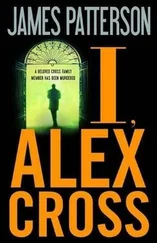“If you have a minute,” I said.
“Come on with me. I’ll give you the nickel tour, five cents off today.”
“Much obliged. Thank you.”
There had been a lot of speculation in the press about the underground passage at Branaff, and a lot of assumptions that it figured into the kidnapping somehow. What wasn’t public knowledge was that Ethan and Zoe’s electronic locators had both been found down here, smashed to pieces at the far end of the tunnel. Whether someone had deliberately put them there to throw us off the scent or dropped them on their way through was still a question mark.
I followed O’Shea through the basement, to an old black steel door at the back. It looked original to the building, except for the brand-new hasp and padlock that had been bolted on.
The custodian used a key from his retractable ring to open it for me and then flipped a light switch just inside.
“Whole thing’s like a T,” he said, leading the way. “Straight on, it’s just a sealed-up hatch where the old coal barn used to be. But if we take a right turn up there, it comes out in the groundskeeping shed down by the playing fields.”
It was supposedly true that Noah Branaff had used this tunnel as part of the Underground Railroad, back in the nineteenth century. It had clearly been refitted since then, with riveted I-beams, a poured concrete floor, and tile on the domed ceiling. Mostly it was used for storage now.
There were mesh lockers with cleaning supplies near the entrance and gardening tools and sports equipment as we got closer to the far end. Very orderly, surprisingly clean.
O’Shea did most of the talking as we walked. He’d been with the school “since Clinton,” he told me, and had seen a lot of “big” families come through, although none bigger and more important than the Coyles.
“What’s your impression of Ethan and Zoe?” I asked. “What kind of kids are they?”
“Ethan’s a good enough egg,” he said. “Scary-smart, too. A lot of the other kids think he’s kind of weird. He got picked on some. Make that a lot .”
“What about Zoe?”
At first, he didn’t answer. He raked his fingers through his hair and seemed a little nervous about the question. “I suppose you want the truth, huh?”
“Don’t worry, Mr. O’Shea. I’m not writing any of this down,” I told him.
“All right, well... truthfully? Zoe Coyle’s a little troublemaker. Anyone who tells you she didn’t try to take advantage twenty-four/seven is either lying or kissing up. And believe me, this school is full of kiss-ups.”
“I can believe that,” I said honestly.
“Don’t get me wrong,” he said. “I’ve been praying for those kids every night. But that girl’s all about seeing what she can get away with. I chased her and her little smoking friends out of here more than once. And she would give me lip.” He stopped as we came to the end of the passage. “Anyway, here we are.”
In front of us, there was a half flight of concrete steps up to another door. This was where the locators had been found, although the crime scene had been cleared days ago. There wasn’t much to see now, but I needed to walk through here at least once.
We kept going and emerged through the groundskeeping “shed,” which was about the size of my house. That put us on the school lawn next to a couple of practice fields and the south gate.
Up the hill, past a line of old bur oaks, I could see the main building we’d just left behind. Very pretty landscaping. Not the kind of scenery you associated with tragedies.
“That’s where the kids came out, supposedly,” O’Shea said, pointing up at the lecture hall windows. “I suppose that they did come out there.”
I turned in a full circle, taking it all in. Did they come this way? Were they conscious? Drugged?
“Kind of a straight line from up there, isn’t it?” the custodian said. “Right through this spot and out that gate. You suppose that’s where they took them?”
“Maybe,” I said. “Maybe not. People don’t always travel in straight lines. In fact, the ones who have something to hide usually don’t.”
He nodded, a little like he was playing cop with me.
“Well,” he said, “you ought to know.”
I spent the rest of the day talking to as many people at the Branaff School as I could. The students were strictly off-limits until I could get parental consent, so I focused on the faculty and staff for the time being.
Dale Skillings was the headmaster. He seemed pretty tightly wound to begin with, but he’d also been through the wringer in the press, and no doubt with the parents as well. Everyone wanted to know how this could possibly happen at Branaff. Inevitably, some of the blame had already landed on the headmaster’s desk. If he was terse, or defensive with me, I could understand why.
“Enemies?” he said when I asked. “They’re two of the most famous children in the world. It’s not possible to avoid some amount of animosity. But if what you’re really asking about is Zoe’s fight with Ryan Townsend, I can’t discuss that with you. You’ll have to take it up with Congressman and Mrs. Townsend.”
In fact, I already had a few calls in on that one. Skillings wasn’t going to budge on the rules where the kids were concerned, but he did make his staff fully available to me, which I appreciated.
One of the sixth-grade math teachers, Eleanor Ruff, told me about how Zoe had barely scraped by in her class and about how Ethan was testing off the charts, no surprise. She was a twenty-year veteran at the school, but her feelings were as close to the surface as anyone’s I interviewed.
“You don’t even like to imagine something like this happening,” she said. She fluttered around her classroom, watering the plants while we talked. Meanwhile, I sat uncomfortably in a student chair that was much too small for me, or even half of me. “Then one day, everything changes. I’m just glad they were taken together. At least they have each other—”
The second she said it, her hand flew up to her mouth and she burst into tears. “Oh, my God! That’s not at all what I meant. I’m so sorry!”
I handed her a tissue from the box on her desk and told her not to be too hard on herself. Every adult at the school had been questioned extensively, multiple times by MPD, the FBI, and Secret Service. The strain was starting to show. That’s also when people tend to say things they might not the first several times around.
The school nurse, a guy named Rodney Glass, held it together better. He’d been in the Peace Corps in Uganda before this, he told me, and it seemed like he’d seen a lot of suffering in Africa. I’d been there and understood what he was talking about.
“Ethan? Yeah, he’s my little lunch buddy,” he said. “I think he’s just more comfortable with adults, you know?”
“Did he come here very often?” I asked, looking around the small, very organized infirmary.
“Sometimes. Pretty much anywhere he could find a quiet corner. I call kids like him free agents. You go into any school at lunchtime, and I guarantee you’ll find a few in the nurse’s office, or hanging around the librarian’s desk, or in guidance. Actually, you should talk to Pam Fitzhugh over there. If you haven’t already. She knows both the Coyles as well as anyone.”
I was lucky to get a few minutes with Ms. Fitzhugh, as it turned out. She and the other guidance staff had been seeing kids for crisis counseling nonstop since the first day.
“Were Ethan or Zoe under any particular stress that you know about?” I asked her. “In the days before, weeks before?”
“No more than usual,” she said. “But that’s all relative, isn’t it? It’s not easy being the president’s children, or any celebrity’s, really, and they both put a lot of pressure on themselves. In different ways.”
Читать дальше
